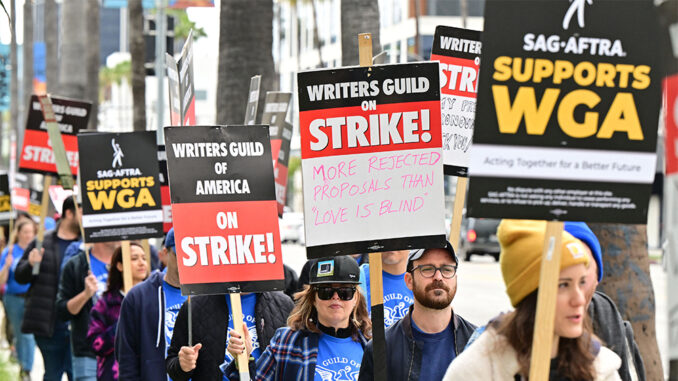
By Shlomie Katash
After 148 days of striking, the Writers Guild of America (WGA) has come to terms with Hollywood’s studios, streaming services, and entertainment companies. The tentative agreement was reached on Sunday, Sept. 24, leading to a unanimous decision among WGA leaders to allow its members to return to work.
While, at first, many of the WGA’s proposals were outright rejected by the entertainment industries, their position has appeared to soften recently as the strike continued to cause a financial strain on Hollywood. The contract includes provisions that address many of the concerns that spurred the writers to strike to begin with, including residual earnings for writers from streaming media, the use of artificial intelligence in the creative process, and general increases in pay and benefits. The contract is set to expire in May 2026, but it will first need to be ratified by the members of the WGA to take effect.
According to CNN, streaming companies agreed to increase minimum writer compensation by 18% and residual pay minimum by more than 25%, while also broadly introducing the possibility for writers being directly paid if their shows become popular. Companies have also pledged to increase transparency surrounding the performance of their streaming projects.
Additionally, companies are now prohibited from using AI to write or rewrite material. Though, writers may choose to use the tool if they are complying with their employer’s policies and are not being forced to do so.
Unions secured an immediate minimum pay boost of 5% with another 4% coming in May 2024, and a similar 3.5% expansion in May 2025, per CNN. Health fund contributions will also benefit from a .5% increase while no longer requiring writers to split them with their pension contributions.
The WGA lauded this deal as a massive and historic win for its members, adding alongside the announcement of the agreement that, “We can say, with great pride, that this deal is exceptional – with meaningful gains and protections for writers in every sector of the membership.”
While the deal is reached for writers, the WGA’s co-strikers of the Screen Actors Guild and the American Federation of Television and Radio Artists (SAG-AFTRA), which represents actors, have yet to find a similar resolution. They remain on strike for the foreseeable future.
